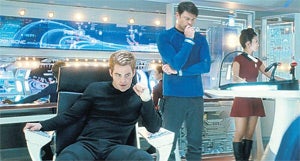Star Trek (12A)
Plenty of fresh enterprise

They're back, the crew of the Starship Enterprise, to boldly remake a cult sci-fi hit that first appeared on TV in the mid-1960s.
There's no denying the retrograde nature of this, joining the conga line of small-screen heroes (Batman, The Hulk et al) awarded a big-screen makeover. But there's a modicum of boldness too in J J Abrams' franchise reboot. After all, it's not about who does it first but who does it best, and even in comparison with the original series, let alone the Next Generation offshoots, this new Star Trek delivers entertainment of a surprisingly high order. Abrams and his writers Roberto Orci and Alex Kurtzman, obliged to appease a new teen audience and the legions of Trekkies who take it as seriously as The Iliad, have hit upon a mood that manages to be responsible and yet mildly irreverent.
The emotional fulcrum of the movie rests on the changing relationship between the two central figures. It seems that the amity between James T Kirk and the Vulcan Spock was not ever thus. When they were cadets of the Starfleet Academy these two were prickly rivals, and even faced one another as defendant and prosecutor. "Who was that pointy-eared bastard?" Kirk (Chris Pine) mutters to his pal after Spock (Zachary Quinto) puts one over him in court. It's Kirk whose character initially seems the less attractive, starting out as a brawling hayseed and then a bumptious trainee too ready to cast off his L-plates. He's still grieving the father he never knew, a former Starship captain who dies heroically in the story's prologue, just as his son is being born. Spock also has filial issues, being the son of Vulcan father and human mother – thus one side of his nature is (famously) "logical", while the other lashes out when he's slighted as half-caste.
Pine, while a long way from the gravitas of William Shatner's original, proves perfectly acceptable as Kirk, setting the tone for a cast that nod to their TV forebears while making room for their own identities. Karl Urban as grumpy "Bones" McCoy, Zoe Saldana as the foxy Uhura, John Cho as Sulu, Anton Yelchin as Chekov (of the comedy Russian accent) and Simon Pegg as Scotty the engineer (supply your own joke here about "thrust") all pull their weight, delivering the techno-balls straight faced and boldly adapting to those mustard V-necks (rayon, possibly drip-dry) which they wore in the original. There is a pleasing sense of a team at work, each applying a particular skill of their own to the collective good. Quinto has the toughest job as Spock, given that Leonard Nimoy, in a twist one might call FutureSpock, makes a significant late appearance that invites direct comparison between old and new. But Quinto is fine as the conflicted Vulcan, those caterpillar eyebrows the single expressive part of his phiz.
The shuffle of time present and time future becomes a bit hazy in the latter stages, and the get-out-of-jail card which allows characters to be magically relocated is perhaps overplayed. This isn't cause for alarm though, since Abrams moves the thing along at such a cracking pace. What does disappoint is the inability of the filmmakers to create a remotely challenging story. With momentous issues of space and race to sort out, not to mention the tensions between youth and age, or between power and responsibility, Star Trek settles for the boring throwback of the evil empire threatening all mankind. Heaven knows we don't want a return to the portentous prolixity of Star Wars or the philosophical blather of the Matrix trilogy, but some small relevance to the world we live in would have been appreciated. Eric Bana plays an intergalactic avenger named Nero – no, really! – who believes Spock wiped out his planet. Nero's spaceship, a gigantic black iron jellyfish, is something to behold and looks capable of chewing up the Starship Enterprise for breakfast. Abrams mounts one or two set pieces that pack a degree of shock'n'awe, including a skydive from space (surely borrowed from Point Break) and a scary sequence in which Kirk is chased across Arctic terrain by a sort of GM walrus.
But contemporary implications are noticeably unremarked. When Nero wants to extract information from the Starship captain (Bruce Greenwood) he resorts to dropping a fake-looking insect down the latter's throat – a water-based torture would have been far more sinister. This isn't a Star Trek for the times. There is no sense that it reflects how America thinks about itself or its place in the world in the way the space race and civil rights impinged on the TV series. Perhaps that makes it suited to the new austerity: long on determination and camaraderie, short on resonance and imagination. There will be plenty of takers for this Enterprise, I think, but they shouldn't count on seeing much that's new in the course of it.
Join our commenting forum
Join thought-provoking conversations, follow other Independent readers and see their replies
Comments
Bookmark popover
Removed from bookmarks